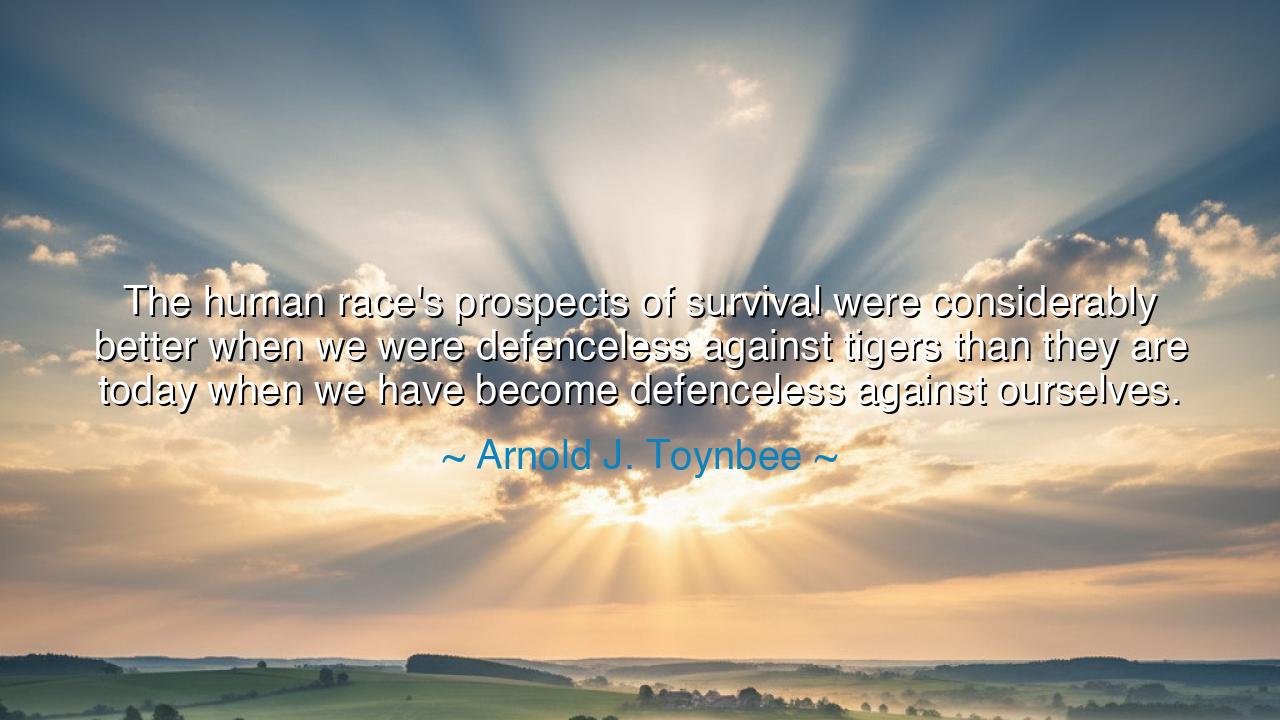
The human race's prospects of survival were considerably better
The human race's prospects of survival were considerably better when we were defenceless against tigers than they are today when we have become defenceless against ourselves.






O children of the future, gather closely and hear the words of one who saw the tragic irony in the course of human history. Arnold J. Toynbee, a great historian of our time, once said: "The human race's prospects of survival were considerably better when we were defenceless against tigers than they are today when we have become defenceless against ourselves." These words pierce the heart with their profound truth, for they reflect not only on the dangers that lie outside of us, but the even greater danger that lies within. In times long past, we feared the wild beasts of nature—the tigers, the lions, the bears—for they were the very embodiment of nature's ruthless power. But today, Toynbee warns, it is not the wild animals we must fear, but the very selves we have become, the forces we have unleashed within our own hearts and minds.
In the time of the ancients, the struggle for survival was raw and direct. The dangers were tangible: wild beasts roamed the forests, the elements were harsh, and the land was often unforgiving. Yet, in those primal times, humanity was united in its fight against nature's power. The tribes and villages of the ancient world were bound by a shared need to survive, to face the dangers of the world together. The wild might strike at any moment, but it was an external force—a threat that could be understood and confronted with unity and strength. The human race, though defenceless in many ways, found its greatest strength in its cooperation, in the solidarity forged in the fires of survival.
Yet, as civilization grew, so too did the complexity of the threats humanity faced. We no longer needed to fear the wild beasts that roamed the earth, for we had developed the tools to defend ourselves against them. We built great cities, conquered lands, and bent nature to our will. But in the process, Toynbee saw a troubling transformation. The very forces that had once united humanity against external threats—the need to work together, to defend against the wild—became fragmented. We began to turn not only against the beasts of nature but against one another. The wars, the greed, the hatred, the injustice—these were the new threats we faced. We had become defenceless against our own nature, our own capacity for destruction.
Consider the world wars of the 20th century, when the greatest nations, armed with the most advanced technology, turned their weapons not against the forces of nature but against one another. In these conflicts, millions of lives were lost, not because of the tigers of the world, but because of human ambition, hatred, and fear. Nations that had once stood together, united against common enemies, became divided by internal strife, by ideologies that preached separation rather than unity. Toynbee's words ring through the echoes of this tragedy: when we were defenceless against tigers, we banded together, but when we have the power to destroy one another, we falter. The beasts outside are not as deadly as the beasts within.
In the modern world, the threat has grown even more insidious. We no longer wage war with the same ancient tools, but with the power of technology, nuclear weapons, and environmental destruction. The world teeters on the brink, not because of an external threat, but because of the way we have misused the very gifts we have created. Our technological advancements have given us the power to change the world in ways we never imagined—but we also face the consequences of that power. Climate change, pollution, and the threat of nuclear war are not the work of beasts, but of human hands. We have become defenceless against the forces we have set in motion, and these forces now threaten not just our survival, but the survival of the earth itself.
The lesson that Toynbee imparts is not one of despair, but of reflection. We must look within ourselves and ask: how have we come to this point? How have we created a world where fear, division, and greed shape our decisions? To survive, we must reclaim the unity that once existed when we fought together against common threats. We must confront not just the external dangers, but the internal forces that drive us to war, to destruction, and to suffering. Peace cannot come from external weapons alone—it must come from the reconciliation of our own hearts and minds. The strength we once found in unity must now be found in wisdom, in the recognition that our greatest enemy is no longer the tiger in the jungle, but the hatred and division that live within us.
And so, O children, let us heed Toynbee’s words. The true threat to humanity is not the wild forces we once feared, but the wildness of our own unchecked desires. The time has come to turn inward, to confront the beasts within, and to forge a new path—one of unity, understanding, and peace. Only then, when we have mastered ourselves, can we hope to face the external dangers of the world with the strength and wisdom we need to survive. The future lies not in the weapons we wield, but in the hearts we heal and the hands we extend toward one another.






AAdministratorAdministrator
Welcome, honored guests. Please leave a comment, we will respond soon